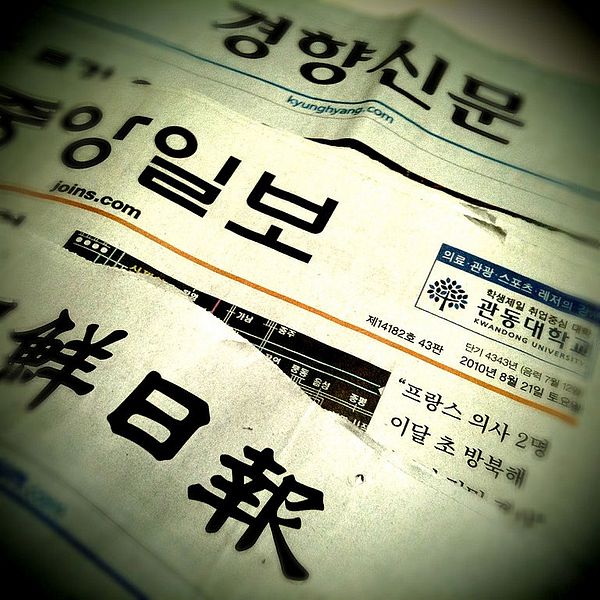
South Korea’s National Assembly is expected to soon pass a change to the Press Arbitration Act that will dramatically increase the punishment for publishing “false or deceptive” information. The government in Seoul is hardly alone in seeking a legal solution to this problem befuddling states across the world. But South Korea may be the only liberal democracy using a “fake news” law to target its largest media companies.
The bill introduces a penalty of five times the estimated damages if a media outlet publishes false information, intentionally or not. It does not include a detailed definition of false information. The damages themselves will be determined by the “social influence and total sales” of the outlet. This clause, though vague, means the country’s most prominent newspapers and TV channels will suffer the most if they’re found guilty of spreading falsities.
Like most countries, South Korea’s political climate is increasingly shaped by conspiracy theorists, who have found huge audiences on internet forums like Ilbe and right-wing YouTube channels. But unlike Singapore’s “fake news” law, which mandated action from Facebook, or Germany’s zero-tolerance policy for social media hate speech, South Korea is going after large, traditional media companies – the very outlets many in other countries see as bulwarks against disinformation.
“Media reform,” as it’s called in Korean, is the latest in a series of bitter battles President Moon Jae-in and his liberal Democratic Party have fought over the laws governing South Korea’s institutions. These debates over how to best govern South Korea’s future are defined by a divide between liberals and conservatives over how to address the country’s tortured history.
Under the authoritarian juntas that ruled South Korea until the first democratic presidential election in 1988, the odds were stacked against the common person and free expression alike. Conglomerates collaborated with the state to build their fortunes and the law came down harshly on advocates for political and labor rights. The mainstream press was either led by government-friendly business interests (see the Samsung family’s control over the JoongAng Ilbo newspaper) or censored to submission by draconian laws.
The biggest media companies from the authoritarian era are still dominant today, with the top three newspapers – the Chosun, JoongAng, and Dong-A dailies – showing a markedly conservative bent. Liberals from Moon’s Democratic Party are uncomfortable with this imbalance, and blame media bias for recent electoral struggles. These conservative papers’ articles make up the bulk of content on portal site Naver, where most Koreans get their news. Only 32 percent of South Koreans trust the media, according to this year’s Oxford-Reuters Institute Digital News Report, ranking 38th out of 46 countries. It’s tempting to link conservative dominance of the press to this low trust, as the Democratic Party is doing.
This is hardly South Korea’s first conflict over laws restricting freedom of expression. The Cold War-era National Security Act bans speech praising North Korea. South Korea’s defamation statute has been used by successive governments, including democratic ones, to quiet political opponents. Unlike almost anywhere else, fact is no defense against a defamation charge in South Korea.
South Korea has made remarkable strides in freedom of expression over the past several decades, however. On Reporters Without Borders’ 2021 World Press Freedom Index, it ranks 42nd overall, the highest in Asia. Yet this toxic divide over who gets to write the narrative over the country’s history has the potential to derail South Korea’s status as a haven of press freedom in a relatively unfavorable region. This year’s “fake news” bill could redefine the future of the press in South Korea in ways that both opponents and proponents would find hard to predict.
Thanks to a late revision, the bill will not allow high-ranking officials and executives at major companies to lodge complaints over false news stories. However, it’s easy to imagine both the dominant conservative press and newer liberal outlets like OhMyNews and Sisain further restricting their coverage over fears of lawsuits from the public that could threaten their survival. Due to the threat of defamation suits, it is already common for South Korean outlets to omit key details, such as the names of individuals and companies, even when that information is either crucial or easily determined from the context of a story. The media is further cowed due to the hold large conglomerates have over advertising revenue.
The bill is facing substantial criticism from local and international media organizations, but the Democratic Party is holding firm. After Reporters Without Borders condemned it as a “threat to journalism,” party leader Song Young-gil fired back, asking “How can they know about our situation?” But by taking this step to correct what they see as a hopelessly biased media landscape, the Democratic Party could be setting the stage for a severely weakened press.

0 Comments